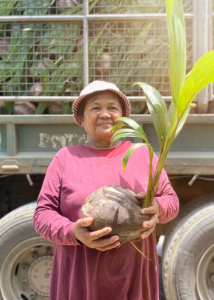Sustainable, affordable nutrition with Century Pacific Food
Featured Members

Affordable nutrition is not always readily available, especially in the Philippines. One of the largest food and beverage companies in the country, Century Pacific Food, has made it their mission to provide affordable nutrition in a sustainable way.
Learn more in our interview with Century Pacific Food, Inc. CEO, Christopher Po, below.
Tell us about Century Pacific Food and your products.
Century Pacific Food, Inc. is a Philippine-based branded food manufacturing company. It is a family-controlled, professionally managed corporation that is listed on the stock exchange. Our family, Century Pacific Group, is the major controlling shareholder, but we also have both institutional and retail investors.
As a company, we compete in several segments, which we like to call the 4 “M”s, namely Marine, Meat, Milk, and other “Emerging” segments like Coconut, Pet Food, and Plant-based Meat Alternatives.
We are home to household names in the Philippines, brands such as Century Tuna, Argentina, 555, Ligo, and Birch Tree. We also have an OEM Exports business in tuna and coconut, where we serve major brands and retailers in the US, Japan, and Europe, among other markets.
As a company, we exist to provide affordable nutrition to as many families as we can through more responsible and sustainable ways.
Your family built Century Pacific Food from the ground up. How has that history formed the foundation of the values you still operate under today? Are there any lessons you would share from your experience as a kid watching your father build and grow the company that you carry with you in leading it today as executive chairman?
Our company culture and values were founded on the ethos of my father. He belonged to a generation of pioneering businessmen, who built the largest companies in the country from practically nothing. He came from humble beginnings. He was a migrant at the age of 16. Eventually, he became a working student who had to drop out of school because he lacked the funds to continue. He knew what hunger felt like at a young age, having experienced it on many occasions. This is why affordable nutrition is such an integral part of our mission.
Over time, through his keen eye for opportunities, entrepreneurial streak, and hard labor, he was able to build Century Pacific into the company that it is today. He used to say, “there’s no substitute for hard work and discipline.” Throughout, he never forgot his roots, remained humble, and empathized deeply with those in need. In the Philippines, we call that “malasakit.”
Building the organization from the ground up instilled in our organization a culture of entrepreneurship, humility, and passion for growth. These timeless values brought us to where we are today, and we’ll continue to espouse them as we move forward.
Growing up, we saw in our father such a strong entrepreneurial drive. We were trained to think and act as entrepreneurs, deeply ingrained with a growth mindset which continues to fuel our drive to push forward and innovate.
Century Pacific Food has always focused on providing affordable nutrition. Why is affordability so important and how does ensuring access to high quality food make an impact?
Affordability is rooted in the demographic we serve. In the Philippines, approximately 80% of the population belong to the base of the pyramid. As an archipelago, transport and power costs are high in the country, making fresh food inaccessible for many households.
In this country, 39% of households rate themselves food-poor – 11 million households. Meanwhile, 12% of households have experienced involuntary hunger.
Then, apart from hunger, there’s also nourishment that we need to consider. From a health standpoint, undernourishment is a concern resulting in stunting among children, chronic energy deficiency, and more.
This is why we focus on affordable nutrition – to give these families access to quality proteins at a price within reach. We see the business as a platform not only to create value, but also have a positive impact because of this urgent situation in the country.
Your company has focused on diversifying products over the last several years. What is the role of alternative meats and dairy products, like your award-winning UnMeat line? What lessons have you learned from these pivots?
Taking from the entrepreneurial and growth mindset of our founder, we think that the Philippine economy can grow over 5-7% or more. We aim to grow twice that.
In addition to growing our existing businesses, we look for adjacencies that are strategically aligned with our growth ambition and where we have the right to win, forming our diversification strategy. Starting from marine and meat, we’ve expanded our portfolio to dairy, plant-based alternatives, coconut, and pet food. All these areas of growth are tied together by our mission to provide affordable nutrition. This is our way of future-proofing the business and securing the longevity of our enterprise.
With a company at the size and scale as yours, how did you get started on your sustainability journey?
The impetus to lessen our impact and become more sustainable comes from many directions, our different stakeholders such as our customers, employees, and shareholders. We are present in markets that look for more sustainable brands and products. We serve a new generation of consumers who patronize brands that resonate with their value. The new breed of employees is the same – people who want to contribute and be part of something bigger than just a job. They want to make a positive impact on the world around them. And of course, we have our shareholders, investors who want to support businesses that practice good governance and aim to grow sustainably.
For my brothers and my family, sustainability is a personal journey. It’s not good enough to think about the bottom line in solus. We’d like to think that we have a role to play in leaving something better for future generations. We fundamentally believe that it’s the right thing to do. It’s not enough to deliver on market share and bottom line. There are better ways of doing things.
You’re quoted as saying, “We believe that sustainability – whether coming up with healthier products, taking care of our people and communities, or being good stewards of our resources – is essential to our longevity.” How do you see Century Pacific evolving on sustainability goals in the next five or 10 years as part of this long-term strategy?
For the past 5 years, we’ve been using our 3P Framework in defining our goals – Protein Delivery, Planet Preservation, and People Development. We believe these are still relevant to our business, but we’d like to evolve as well to create bolder goals that can reflect our impact across these three pillars. Under Protein Delivery, we’d like to be able to measure our impact on the health and wellness of our consumers. On Planet Preservation, climate change is one area that we’d like to tackle more thoroughly as a company. We are in the process of developing a roadmap to address our carbon footprint. Lastly, around People Development, we believe that our organization is a platform to create employment and livelihood opportunities that can uplift lives.
Part of your sustainability strategy is ensuring transparency in your supply chain. How do you approach achieving supply chain sustainability and what have you learned along the way?
We look beyond the sustainability of our own company and engage our suppliers to assess their sustainability efforts. Our procurement team takes care of ensuring suppliers are able to consistently provide us with high-quality raw materials, compliant
with government regulations and accredited by international organizations. At the moment, we are able to trace the origins of our major raw materials such as fish, meat, milk powder, and coconut back to the fishing ground or farm each main raw material was sourced from.
We institutionalized a Supplier Code of Conduct and Ethics for all raw material suppliers and service providers that include the systematic assessment of their social performance during the procurement process, among others. All legally binding agreements require compliance with the set social standards.
The operative word here would be “engage.” We need to actively engage our suppliers to effectively manage our supply chain. Our procurement team provides them with tools and opportunities for learning such as forums to encourage them in their own sustainability journey.

Could you share with us a story or event that has really resonated with you and furthered your commitment to the inclusive capitalism movement?
We often receive unsolicited gratitude from our consumers for producing food that they can afford. Others are thankful that our products are always available and that they can really depend on us, especially in trying times. One thing that motivates us is this type of feedback.
We like unlocking Win-Win-Win ideas – programs that benefit multiple stakeholders. One example is the 1 Million Coconut Trees project. We planted and donated to smallholder farmers a million coconut seedlings which will help make their farms more productive and boost their income. At the same time, these trees will sequester carbon from the atmosphere and help secure long-term coconut supply in the country – a win for the farmers, for the environment, and for the company.
We have projects that are financially rewarding such as our solar plant, allowing us to generate the power that we need in a cost effective and sustainable way.
These programs are appreciated by our employees, our customers, and our shareholders, inspiring us to do more.
Finish this thought: “Business at its best is…”
Business at its best aligns profit and purpose.

